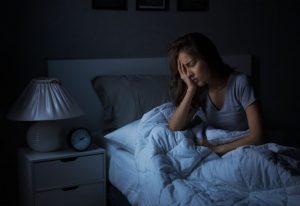Vitamin D is a critical nutrient, impacting physical and mental health and well-being in numerous ways. Recent research has shed further light on the long-suspected links between vitamin D and sleep. According to a study published in Current Pharmaceutical Design, vitamin D plays both an indirect and direct role in regulating sleep. Furthermore, other studies have linked low levels of vitamin D to a greater likelihood of experiencing sleep issues, such as shorter sleep duration, poor sleep quality and sleep disorders.
Vitamin D deficiency is quite common, affecting an estimated 30 to 50 percent of all people and considered by many health professionals to be a significant public health issue.
Studies Link Low Vitamin D Levels to Sleep Problems
 In recent years, a number of studies have found a link between low levels of vitamin D and a higher risk of experiencing sleep problems. A 2018 systematic review and meta-analysis of multiple studies also revealed a link between vitamin D deficiency and sleep disorders. A 2014 study of elderly people suggests that vitamin D influences sleep duration, with those getting the least sleep more likely to have low levels of vitamin D.
In recent years, a number of studies have found a link between low levels of vitamin D and a higher risk of experiencing sleep problems. A 2018 systematic review and meta-analysis of multiple studies also revealed a link between vitamin D deficiency and sleep disorders. A 2014 study of elderly people suggests that vitamin D influences sleep duration, with those getting the least sleep more likely to have low levels of vitamin D.
Another study of more than 3,000 men over age 68, utilizing blood tests for vitamin D levels and wrist-worn devices to measure time spent in bed and sleep time, also found connections. After controlling for other factors, such as time of year, health conditions and age, the researchers found that those with lower levels of vitamin D were more likely to sleep five hours or less in the night and were also more likely to have measurably poorer sleep quality.
How Vitamin D Influences Sleep
While there is a growing body of evidence associating vitamin D deficiency with sleep problems, there is still a lot of work to be done in determining the specific functions of vitamin D in relation to sleep. Research is ongoing regarding how vitamin D influences sleep, but there is some evidence that vitamin D plays a role in the complex processes involved in the production of melatonin, a hormone that aids in the regulation of the sleep-wake cycle and helps to regulate the circadian rhythm. There is also indication of a role for vitamin D in the regulation of serotonin.
Other ways that low vitamin D levels may impact sleep duration and quality have to do with the role of this vitamin in such complex processes as transcriptional changes in a broad range of cell types and in the transcription of circadian-rhythm-related genes. When there is insufficient vitamin D present to carry out these sorts of complex essential processes, it can have a negative impact on health which, in turn, can have a negative impact on sleep and be disruptive to the circadian rhythm.
Vitamin D Deficiency Has Become Common
Globally, vitamin D deficiency has become recognized as a public health problem. Interestingly, modern lifestyles are a factor. Today, people are more urbanized, spending much of their day in indoor settings. This decrease in time spent outside in the sun contributes to lower levels of vitamin D, which is often called the sunshine vitamin because of the role of the sun in its production in the body.
People in institutional settings are more likely to have low vitamin D levels. About 60 percent of elderly adults in nursing homes are insufficient in vitamin D, as are 57 percent of those in hospitals. When people are spending time outside, they are often using sunscreen on their skin. A sun protection factor (SPF) 15 sunscreen blocks about 99 percent of vitamin D production by the skin.
Aside from those living in institutional settings or otherwise spending little time outside to get sun exposure, those with darker skin tones or in cultures where maximum skin coverage is the social norm for clothing are more likely to have lower vitamin D levels. Age and obesity also seem to be associated with lower vitamin D levels, with elderly people producing about 75 percent of the vitamin D a younger person does via the skin. The shorter, colder days of the winter season can also contribute to lower levels of vitamin D due to less time spent outside and wearing more clothing to protect against the cold.
How You Can Maintain Healthy Vitamin D Levels
 While plenty has been said about the risks of sun exposure – thus our excessive use of sunscreen – it is also important to recognize that for better sleep and better health, some sun exposure is necessary. Try to get five to ten minutes of sun exposure, without putting sunscreen on your skin, each day.
While plenty has been said about the risks of sun exposure – thus our excessive use of sunscreen – it is also important to recognize that for better sleep and better health, some sun exposure is necessary. Try to get five to ten minutes of sun exposure, without putting sunscreen on your skin, each day.
Getting enough vitamin D daily from food alone can be quite a challenge. Fatty fish, such as sardines, tuna and salmon, and egg yolks are among the richest sources. Commercial milk typically has vitamin D added, as do some other food products, like breakfast cereals. Some sunlight exposed mushrooms have a little vitamin D, but there are not many great plant-based natural (meaning not fortified) options for vegetarians and vegans. Taking a good quality vitamin D supplement is also a good way to be sure that you are getting enough vitamin D on a daily basis.







